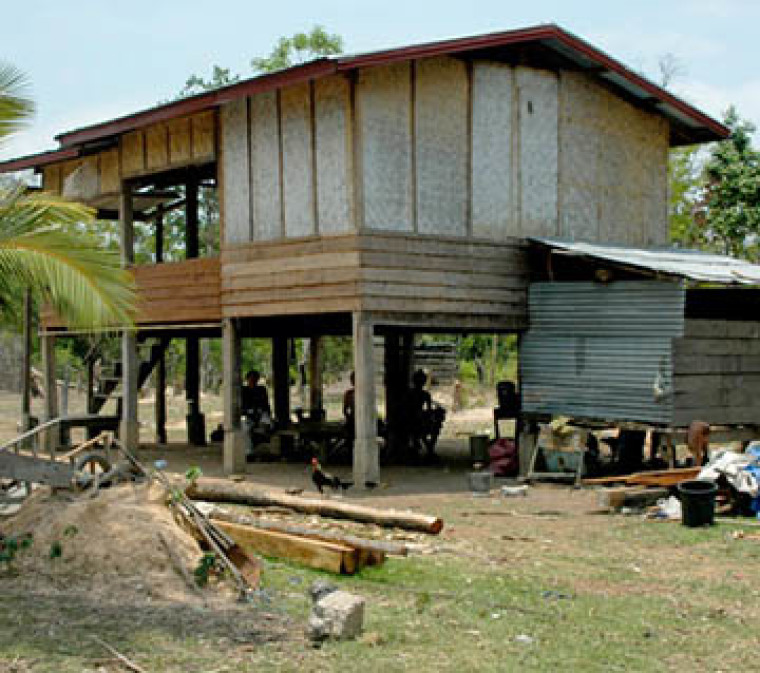
Police arrested Wanna and fellow pastor and inmate Yohan, both identified only by a single name, on Jan. 4 along with several other Christians in central Laos's Khammouan Province.
Prison authorities have repeatedly told the men that they will "walk free" as soon as they sign documents renouncing their faith, advocacy group Human Rights Watch for Lao Religious Freedom (HRWLRF) said in a press statement today.
Wanna is the pastor of an unregistered church in Nakoon village, Hinboun district, while Yohan pastors a similar church in nearby Tonglar village.
Hinboun district police arrested Wanna, Yohan and nine others at gunpoint on Jan. 4 and charged them with holding a "secret meeting" after they celebrated Christmas without prior approval. Police then loaded the Christians onto a truck and took them to Khammouan provincial prison in Takkhet City. (See www.compassdirect.org, "Lao Officials Arrest 11 Christians at Gunpoint," Jan. 6)
By Jan. 6 police had released eight of the detainees – including two children ages 4 and 8 – after they paid fines. A ninth prisoner, identified only as Kane, was released shortly afterwards, HRWLRF reported.
Wanna and Yohan were the principal breadwinners for their families. Their imprisonment left their wives and families with no means of financial support; several of Wanna's children have since left school to find work, according to HRWLRF.
Harsh conditions in the prison have also taken their toll on Wanna; after a recent visit, family members observed that he had lost weight, contracted an infection and seemed extremely weak, according to HRWLRF.
The families have appealed for advocacy as both men remain in prison on charges directly related to their faith.
"Our greatest concern right now is for these two men," a HRWLRF spokesman confirmed to Compass. "Presently, relatively speaking, there is less opposition and persecution of Christians, but these men need help."
A report issued in May by the U.S. Commission on International Religious Freedom states that while Protestants in urban areas last year reported an increased ability to "worship without restrictions," provincial authorities continued to "severely violate freedom of religion or belief, particularly of ethnic minority Protestants." Rights abuses including "detentions, surveillance, harassment, property confiscation, forced relocations and forced renunciations of faith" in 2010 have kept Laos on the Commission's Watch List for 2011.
Rice, Wells Needed for Katin Christians
In Katin village in Ta-Oih district, Saravan Province, conditions for a group of Christians expelled from the village last year have vastly improved since the beginning of the dry season in February, when the group resorted to begging for food. (See www.compassdirect.org, "Christians Deprived of Food, Water at 'Critical Stage,'" Feb. 25)
"They're still living at the edge of the jungle, but they're in good health, with a good supply of rainwater and food from the jungle," the HRWLRF spokesman said. "Each family is now growing rice on a few hectares of land near their settlement. But they will need a supply of rice every month until their first harvest matures in mid-September."
If authorities permit, the Christians also hope to dig wells in the coming months to ensure a more permanent water supply over the next dry season.
Officials marched 11 Christian families, totaling 48 people, out of Katin village at gunpoint in January 2010 after they repeatedly refused to give up their faith. The officials left them to find shelter about six kilometers (nearly four miles) outside the village and confiscated the Christians' homes, livestock, and essential registration documents. A further seven families, totaling 15 people, were forced to leave the village last December.
Villagers then thwarted the Christians' efforts to plant rice on commonly-owned village land and warned people in neighboring villages not to assist the Christians as they were "breaking the law" by following Christ – even though provincial-level authorities had told the Christians they had the right to worship as they chose.
In recent months, district authorities have tacitly recognized the expelled Christians as a group separate from other Katin villagers and allowed them to remain in their temporary settlement, the HRWLRF spokesman said. Other villagers oppose their faith but are presently "not causing any trouble" and in fact a few Christians living in Katin quietly join the outcasts for worship without harassment.
"The district authorities directly oversee them and provide education for their children," he said. "However, they don't provide physical help."
Authorities have allowed some of the children to attend school in nearby Ta-Oih township and allowed others to relocate to an orphanage in Savannakhet, where they have better living conditions and access to education.
The situation is not fully resolved, however, as the Katin Christians have no official documentation stating their right to remain at the edge of the jungle, let alone their right to worship.
For more information, visit www.compassdirect.org